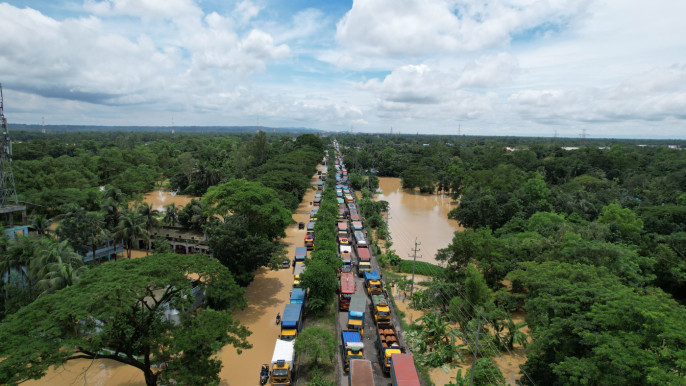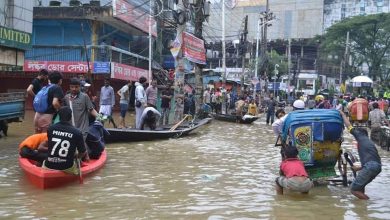Flood disrupts vital Ctg supply chain, halts trade, transport

Kahtunganj trade drops by 70%
A long tailback on a highway in Chattogram on 23 August 2024. Photo: Mohammad Minhaj Uddin/TBS
The ongoing flood has severely disrupted the Dhaka-Chattogram highway for the past four days, bringing trade between the capital and the port city to a standstill.
The supply chain for essential commodities from Khatunganj, the country’s largest wholesale market in Chattogram, has nearly collapsed, with staple goods like rice, onions, oil, flour, garlic, spices, and lentils failing to reach various districts.
Chattogram Port, already burdened by delays due to recent political unrest, is now facing an even worse import-export crisis due to the floods, according to traders.
Apparel exporters are under pressure to meet deadlines and warn that without a swift resolution, the supply chain could deteriorate further.
Both road and rail communication between Chattogram and other parts of the country have been completely cut off. For the past two days, no goods-laden vehicles have been able to travel from Chattogram to Dhaka or other routes.
A 45km stretch of the Dhaka-Chattogram highway has been paralysed by a massive traffic jam since the night of 23 August, with over 3,500 vehicles stranded. Relief trucks and other vehicles carrying aid for flood victims are also trapped.
There are also reports of theft and looting from these stranded vehicles.
Apparel exporters seek army’s help
BGMEA President Khandoker Rafiqul Islam stated that exporters are concerned about transporting goods via the Dhaka-Chattogram highway, particularly over the Lemua Bridge near Feni.
He said they have requested assistance from the Bangladesh Army’s engineering corps to assess the bridge’s condition.
He also mentioned that a BGMEA director is closely overseeing the situation and staying in contact with the Army to find a swift solution. Over 1,000 trucks loaded with export goods, imports, and raw materials are currently stuck on the highway.
“We are falling behind our deadlines,” said the BGMEA president.
Sheikh Ershad Uddin, managing director of Leaf Grade Casualwear, said their two containers of export-bound goods have been stuck on the road for the past two days, with three additional trucks of imported raw materials stranded at the port.
“As a joint venture company, we rely on imported materials from our Chinese factory. This delay could affect our shipment deadlines,” he noted, explaining that they typically require a minimum of 45 days’ lead time for denim products.
ATM Mahbubul Alam Milton, executive director of Masco Group, reported that over 70 of their trucks are stuck in various locations—17 at the port, four on highways, and 49 at their factories due to the road disruption.
Some BGMEA members also raised concerns over the security of export laden trucks stuck on the highway.
Meanwhile, the Cumilla EPZ authority has announced a three-day general holiday starting Saturday, according to the industry insiders.
The sudden flash flood has disrupted all road communications within the EPZ, caused the water treatment plant to overflow, and affected water supplies, they said.
Sirajul Islam Azad, chief human resources officer at Bitopi Group, said this closure could result in losses of at least Tk3 crore for their factory in the EPZ.
Delivery from port suffers
Officials said that daily container deliveries from Chattogram Port typically average around 4,000 TEUs. However, deliveries fell to over 3,900 TEUs on 21 and 22 August and have since dropped below 1,000 TEUs.
Liaquat Ali, secretary of port affairs at the Chattogram C&F Agents Association, said road traffic has nearly stopped, leaving thousands of vehicles stranded and causing a severe shortage of trucks for transporting goods.
“In such a situation, we’re struggling to find vehicles,” he said. “Even after completing all the necessary processes for delivering imported goods, the lack of available trucks means that these goods remain stuck at the port.”
Additionally, the cost of transporting goods has nearly doubled due to the shortage of vehicles, added Liaquat.
Export trucks decreasing
Export goods, including readymade garments, are typically loaded into containers at Chattogram’s private depots before being transported to the port. Normally, around 3,500 trucks deliver these goods daily to 19 depots in Chattogram.
However, the Bangladesh Inland Container Depot Association said only 985 trucks delivered goods in the past 24 hours as of 8am today, a 72% drop from previous days.
Despite fewer goods arriving, there are no issues with sending containers to the port, and container congestion for exports has eased.
Depot Association’s Secretary General Ruhul Amin Sikder said that normally, there are about 8,000 export containers at the 19 depots.
During the quota reform protests, this number surged over 15,000. On 16 August, the number of containers reached 15,075 TEUs. As of 24 August, there are 11,035 export containers at the depots, still about 3,000 TEUs more than usual.
Trade down 70% in Khatunganj
In Chattogram’s Khatunganj, trading has dropped by at least 70%, according to traders. Goods from various regions are stuck on the Dhaka-Chattogram highway, disrupting transportation for wholesalers.
Jamal Hossain, organising secretary of Khatunganj Trade and Industries Association, said Chaktai-Khatunganj sees daily transactions of around TK1,000-Tk1,500 crore in around 5,000 shops, warehouses, and depots.
However, transactions dropped by at least Tk3,000 over the past four days, he said.
Solaiman Badsha, former president of the Chaktai-Khatunganj Warehouse Traders Association, said that normally 250-300 trucks deliver essential goods daily to Chaktai-Khatunganj and Asadganj.
However, due to traffic blockages on the Dhaka-Chattogram highway, trade has been halted with all districts except the hill tracts and Cox’s Bazar.
“While sales of flood relief dry food have risen, overall market activity has dropped by 60%-70% due to the disruption,” he added.
Dry food prices up
In Khatunganj, demand for flood relief items like flattened rice, puffed rice, molasses, biscuits, candles, matches, oral saline, bottled water, and life jackets has surged.
Consequently, the wholesale price of flattened rice has doubled from Tk1,000 to Tk2,100 per 25 kg bag, and puffed rice has increased by up to Tk20 per kg.
Azizul Haque, a trader in Khatunganj, said the surge in dry food sales has led to unfair price increases by unscrupulous sellers. The military fined several vendors Tk4 lakh today for overcharging, but prices have already risen again today, he added.
Additionally, Farid Uddin Ahmed, another trader, noted that the price of a 50 kg sack of rice has increased by up to Tk300 over the past three days.







